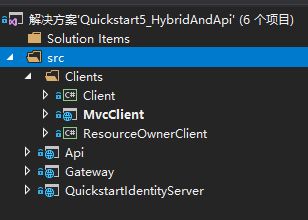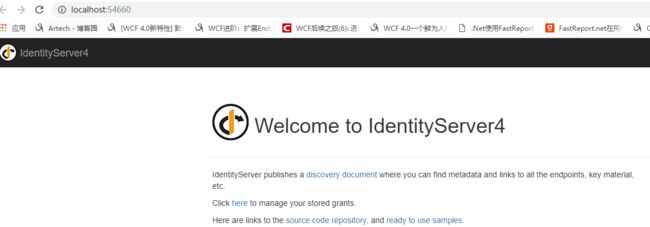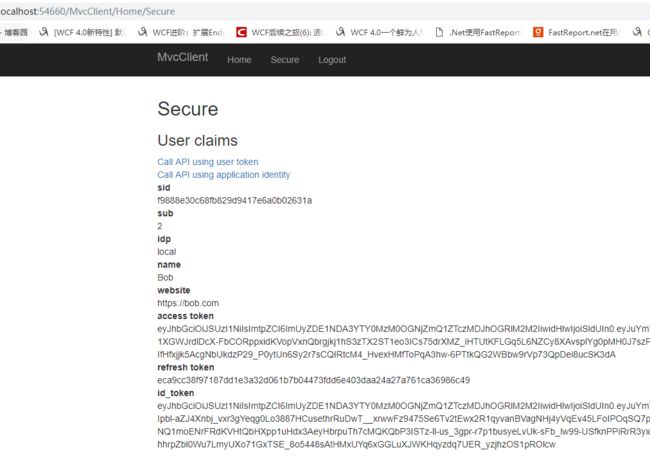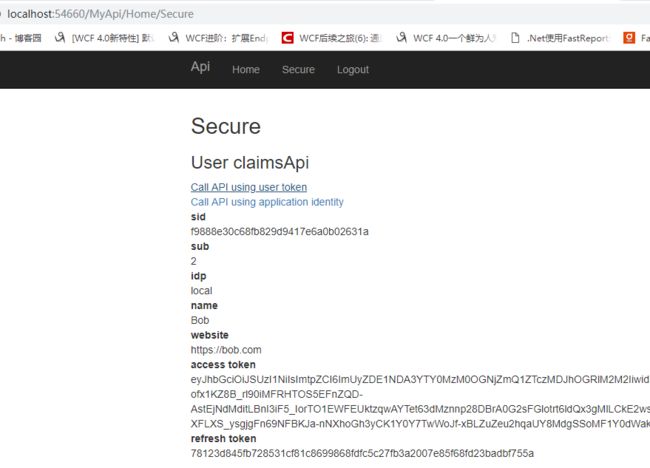关于IdentityServer4与ocelot博客园里已经有很多介绍我这里就不再重复了。
ocelot与IdentityServer4组合认证博客园里也有很多,但大多使用ocelot内置的认证,而且大多都是用来认证API的,查找了很多资料也没看到如何认证oidc,所以这里的ocelot实际只是作为统一入口而不参与认证,认证的完成依然在客户端。代码是使用IdentityServer4的Quickstart5_HybridAndApi 示例修改的。项目结构如下
一 ocelot网关
我们先在示例添加一个网关。
修改launchSettings.json中的端口为54660
"NanoFabricApplication": { "commandName": "Project", "launchBrowser": true, "applicationUrl": "http://localhost:54660", "environmentVariables": { "ASPNETCORE_ENVIRONMENT": "Development" } }
配置文件如下
{ "ReRoutes": [ { // MvcClient "DownstreamPathTemplate": "/MvcClient/{route}", "DownstreamScheme": "http", "DownstreamHostAndPorts": [ { "Host": "localhost", "Port": 50891 } ], "UpstreamPathTemplate": "/MvcClient/{route}", "UpstreamHeaderTransform": { "X-Forwarded-For": "{RemoteIpAddress}" } }, { // signin-oidc "DownstreamPathTemplate": "/signin-oidc", "DownstreamScheme": "http", "DownstreamHostAndPorts": [ { "Host": "localhost", "Port": 50891 } ], "UpstreamPathTemplate": "/signin-oidc", "UpstreamHeaderTransform": { "X-Forwarded-For": "{RemoteIpAddress}" } }, { // signout-callback-oidc "DownstreamPathTemplate": "/signout-callback-oidc", "DownstreamScheme": "http", "DownstreamHostAndPorts": [ { "Host": "localhost", "Port": 50891 } ], "UpstreamPathTemplate": "/signout-callback-oidc", "UpstreamHeaderTransform": { "X-Forwarded-For": "{RemoteIpAddress}" } }, { // MyApi "DownstreamPathTemplate": "/MyApi/{route}", "DownstreamScheme": "http", "DownstreamHostAndPorts": [ { "Host": "localhost", "Port": 50890 } ], "UpstreamPathTemplate": "/MyApi/{route}", "UpstreamHeaderTransform": { "X-Forwarded-For": "{RemoteIpAddress}" } }, { // IdentityServer "DownstreamPathTemplate": "/{route}", "DownstreamScheme": "http", "DownstreamHostAndPorts": [ { "Host": "localhost", "Port": 50875 } ], "UpstreamPathTemplate": "/IdentityServer/{route}", "UpstreamHeaderTransform": { "X-Forwarded-For": "{RemoteIpAddress}" } }, { // IdentityServer "DownstreamPathTemplate": "/{route}", "DownstreamScheme": "http", "DownstreamHostAndPorts": [ { "Host": "localhost", "Port": 50875 } ], "UpstreamPathTemplate": "/{route}", "UpstreamHeaderTransform": { "X-Forwarded-For": "{RemoteIpAddress}" } } ] }
这里我们定义3个下游服务,MvcClient,MyApi,IdentityServer,并使用路由特性把signin-oidc,signout-callback-oidc导航到MvcClient,由MvcClient负责生成最后的Cooike。并将默认路由指定到IdentityServer服务。
在ConfigureServices中添加Ocelot服务。
services.AddOcelot() .AddCacheManager(x => { x.WithDictionaryHandle(); }) .AddPolly()
在Configure中使用Ocelot中间件
app.UseOcelot().Wait();
Ocelot网关就部署完成了。
二 修改QuickstartIdentityServer配置
首先依然是修改launchSettings.json中的端口为50875
在ConfigureServices中修改AddIdentityServer配置中的PublicOrigin和IssuerUri的Url为http://localhost:54660/IdentityServer/
services.AddIdentityServer(Option => { Option.PublicOrigin = "http://localhost:54660/IdentityServer/"; Option.IssuerUri = "http://localhost:54660/IdentityServer/"; }) .AddDeveloperSigningCredential() .AddInMemoryIdentityResources(Config.GetIdentityResources()) .AddInMemoryApiResources(Config.GetApiResources()) .AddInMemoryClients(Config.GetClients()) .AddTestUsers(Config.GetUsers());
这样一来发现文档中的IdentityServer地址就变为网关的地址了,进一步实现IdentityServer的负载均衡也是没有问题的。
修改Config.cs中mvc客户端配置如下
ClientId = "mvc", ClientName = "MVC Client", AllowedGrantTypes = GrantTypes.HybridAndClientCredentials, ClientSecrets = { new Secret("secret".Sha256()) }, // AccessTokenType = AccessTokenType.Reference, RequireConsent = true, RedirectUris = { "http://localhost:54660/signin-oidc" }, PostLogoutRedirectUris = { "http://localhost:54660/signout-callback-oidc" }, AllowedScopes = { IdentityServerConstants.StandardScopes.OpenId, IdentityServerConstants.StandardScopes.Profile, "api1" }, AllowOfflineAccess = true, //直接返回客户端需要的Claims AlwaysIncludeUserClaimsInIdToken = true,
主要修改RedirectUris和PostLogoutRedirectUris为网关地址,在网关也设置了signin-oidc和signout-callback-oidc转发请求到Mvc客户端。
三 修改MvcClient
修改MvcClient的launchSettings.json端口为50891。
修改MvcClient的Authority地址为http://localhost:54660/IdentityServer和默认路由地址MvcClient/{controller=Home}/{action=index}/{id?}
JwtSecurityTokenHandler.DefaultInboundClaimTypeMap.Clear(); services.AddAuthentication(options => { options.DefaultScheme = "Cookies"; options.DefaultChallengeScheme = "oidc"; //options.DefaultSignInScheme = CookieAuthenticationDefaults.AuthenticationScheme; }) .AddCookie("Cookies",options=> { options.ExpireTimeSpan = TimeSpan.FromMinutes(30); options.SlidingExpiration = true; }) .AddOpenIdConnect("oidc", options => { options.SignInScheme = "Cookies"; options.Authority = "http://localhost:54660/IdentityServer"; options.RequireHttpsMetadata = false; options.ClientId = "mvc"; options.ClientSecret = "secret"; options.ResponseType = "code id_token"; options.SaveTokens = true; options.GetClaimsFromUserInfoEndpoint = true; options.Scope.Add("api1"); options.Scope.Add("offline_access"); });
app.UseMvc(routes => { routes.MapRoute( name: "default", template: "MvcClient/{controller=Home}/{action=index}/{id?}"); });
修改HomeController,将相关地址修改为网关地址
public async TaskCallApiUsingClientCredentials() { var tokenClient = new TokenClient("http://localhost:54660/IdentityServer/connect/token", "mvc", "secret"); var tokenResponse = await tokenClient.RequestClientCredentialsAsync("api1"); var client = new HttpClient(); client.SetBearerToken(tokenResponse.AccessToken); var content = await client.GetStringAsync("http://localhost:54660/MyApi/identity"); ViewBag.Json = JArray.Parse(content).ToString(); return View("json"); } public async Task CallApiUsingUserAccessToken() { var accessToken = await HttpContext.GetTokenAsync("access_token"); //OpenIdConnectParameterNames var client = new HttpClient(); client.SetBearerToken(accessToken); var content = await client.GetStringAsync("http://localhost:54660/MyApi/identity"); ViewBag.Json = JArray.Parse(content).ToString(); return View("json"); }
四 修改Api项目
Api项目修改多一点。
将MvcClient的HomeController和相关视图复制过来,模拟MVC与API同时存在的项目。
修改Api的launchSettings.json端口为50890。
修改Startup
public class Startup { public void ConfigureServices(IServiceCollection services) { services.AddDataProtection(options => options.ApplicationDiscriminator = "00000").SetApplicationName("00000"); services.AddMvc(); JwtSecurityTokenHandler.DefaultInboundClaimTypeMap.Clear(); services.AddAuthentication(options => { options.DefaultScheme = "Cookies"; options.DefaultChallengeScheme = "oidc"; }).AddCookie("Cookies") .AddOpenIdConnect("oidc", options => { options.SignInScheme = "Cookies"; options.Authority = "http://localhost:54660/IdentityServer"; options.RequireHttpsMetadata = false; options.ClientId = "mvc"; options.ClientSecret = "secret"; options.ResponseType = "code id_token"; options.SaveTokens = true; options.GetClaimsFromUserInfoEndpoint = true; options.Scope.Add("api1"); options.Scope.Add("offline_access"); }) .AddIdentityServerAuthentication("Bearer", options => { options.Authority = "http://localhost:54660/IdentityServer"; options.RequireHttpsMetadata = false; options.ApiSecret = "secret123"; options.ApiName = "api1"; options.SupportedTokens= SupportedTokens.Both; }); services.AddAuthorization(option => { //默认 只写 [Authorize],表示使用oidc进行认证 option.DefaultPolicy = new AuthorizationPolicyBuilder("oidc").RequireAuthenticatedUser().Build(); //ApiController使用这个 [Authorize(Policy = "ApiPolicy")],使用jwt认证方案 option.AddPolicy("ApiPolicy", policy => { policy.AddAuthenticationSchemes(JwtBearerDefaults.AuthenticationScheme); policy.RequireAuthenticatedUser(); }); }); } public void Configure(IApplicationBuilder app, IHostingEnvironment env) { //var options = new ForwardedHeadersOptions //{ // ForwardedHeaders = ForwardedHeaders.XForwardedFor | ForwardedHeaders.XForwardedProto | ForwardedHeaders.XForwardedHost, // ForwardLimit = 1 //}; //options.KnownNetworks.Clear(); //options.KnownProxies.Clear(); //app.UseForwardedHeaders(options); //if (env.IsDevelopment()) //{ // app.UseDeveloperExceptionPage(); //} //else //{ // app.UseExceptionHandler("/Home/Error"); //} app.UseAuthentication(); app.UseStaticFiles(); app.UseMvc(routes => { routes.MapRoute( name: "default", template: "MyApi/{controller=MAccount}/{action=Login}/{id?}"); }); } }
主要添加了oidc认证配置和配置验证策略来同时支持oidc认证和Bearer认证。
修改IdentityController中的[Authorize]特性为[Authorize(Policy = "ApiPolicy")]
依次使用调试-开始执行(不调试)并选择项目名称启动QuickstartIdentityServer,Gateway,MvcClient,Api,启动方式如图
应该可以看到Gateway启动后直接显示了IdentityServer的默认首页
在浏览器输入http://localhost:54660/MVCClient/Home/index进入MVCClient
点击Secure进入需要授权的页面,这时候会跳转到登陆页面(才怪
实际上我们会遇到一个错误,这是因为ocelot做网关时下游服务获取到的Host实际为localhost:50891,而在IdentityServer中设置的RedirectUris为网关的54660,我们可以通过ocelot转发X-Forwarded-Host头,并在客户端通过UseForwardedHeaders中间件来获取头。但是UseForwardedHeaders中间件为了防止IP欺骗攻击需要设置KnownNetworks和KnownProxies以实现严格匹配。当然也可以通过清空KnownNetworks和KnownProxies的默认值来不执行严格匹配,这样一来就有可能受到攻击。所以这里我直接使用硬编码的方式设置Host,实际使用时应从配置文件获取,同时修改MvcClient和Api相关代码
app.Use(async (context, next) => { context.Request.Host = HostString.FromUriComponent(new Uri("http://localhost:54660/")); await next.Invoke(); }); //var options = new ForwardedHeadersOptions //{ // ForwardedHeaders = ForwardedHeaders.XForwardedFor | ForwardedHeaders.XForwardedProto | ForwardedHeaders.XForwardedHost, // ForwardLimit = 1 //}; //options.KnownNetworks.Clear(); //options.KnownProxies.Clear(); //app.UseForwardedHeaders(options);
在反向代理情况下通过转发X-Forwarded-Host头来获取Host地址应该时常见设置不知道还有没有其他更好的解决办法。
再次启动MVCClient并输入http://localhost:54660/MvcClient/Home/Secure。
使用bob,password登陆一下
点击Yes, Allow返回http://localhost:54660/MvcClient/Home/Secure,此时可以查看到登陆后的信息
分别点击Call API using user token和Call API using application identity来验证一下通过access_token和ClientCredent模式请求来请求API
成功获取到返回值。
输入http://localhost:54660/myapi/Home/index来查看API情况
请求成功。
点击Secure从API项目查看用户信息,此时展示信息应该和MvcClient一致
嗯,并没有看到用户信息而是又到了授权页.....,这是因为.netCore使用DataProtection来保护数据(点击查看详细信息),Api项目不能解析由MvcClient生成的Cookie,而被重定向到了IdentityServer服务中。
在MvcClient和Api的ConfigureServices下添加如下代码来同步密钥环。
services.AddDataProtection(options => options.ApplicationDiscriminator = "00000").SetApplicationName("00000");
再次启动MvcClient和Api项目并在浏览器中输入http://localhost:54660/MvcClient/home/Secure,此时被要求重新授权,点击Yes, Allow后看到用户信息
再输入http://localhost:54660/myapi/Home/Secure从API项目查看用户信息
分别点击Call API using user token和Call API using application identity来验证一下通过access_token和ClientCredent模式请求来请求API
请求成功。
如此我们便实现了通过ocelot实现统一入口,通过IdentityServer4来实现认证的需求
源代码 https://github.com/saber-wang/Quickstart5_HybridAndApi
参考
https://www.cnblogs.com/stulzq/category/1060023.html
https://www.cnblogs.com/xiaoti/p/10118930.html
https://www.cnblogs.com/jackcao/tag/identityserver4/











